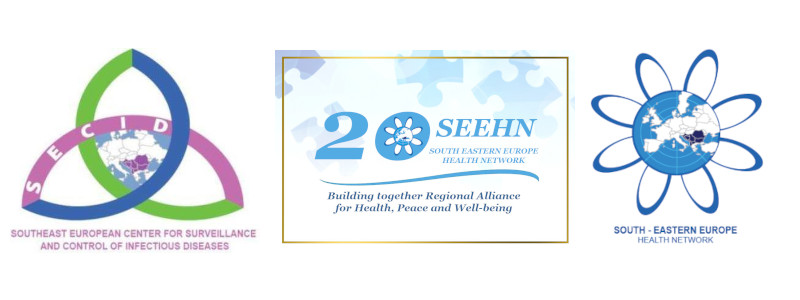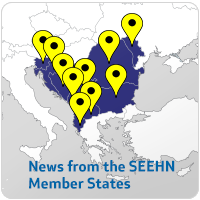
On 9 February 2021 representatives from SEEHN Member States, WHO Regional Office for Europe, Slovenia, CDC, ECDC and Kosovo*, gathered in a virtual meeting.
The discussion focused around the COVID-19 Vaccination challenges and opportunities. More than 40 participants joined the conversation and shared valuable experience on the state of affairs in their countries.
The current sensitive situation related to COVID vaccination in terms of availability, distribution and access are at different degrees in most of the countries.
The WHO EURO representative stressed that safe and effective vaccines are the critical tool to contain the pandemic. An overview of the landscape of the potential COVID vaccines was presented and the unprecedented effort was put together to tackle the pandemic that could be used in the future to boost solutions for other challenges. Regional mechanism for monitoring the countries COVID-19 preparedness needed to identify the programmatic areas that need strengthening.
The State of Israel presentation showed that they are a role model, so far, in terms of vaccination strategy and implementation and they shared important lessons learned that could be used in SEE Region.
Slovenia highlighted the importance of access to the vaccination to all the citizens, including minorities and migrants.
The country presentations revealed and highlighted the most common specific challenges: the overloaded human resources, delays in vaccine delivery, the media pressure and population acceptance of the COVID vaccines etc.
The ECDC Representative presented the stress test and reflected on the support provided to the countries who carried out this exercise that is mainly a self-assessment of the preparedness degree. The Western Balkans countries participated to it on the 1.02.2021. The preliminary results were shared and discussed on the 5.02.2021. The highlights emerged from the stress test were:
• The opportunity to rehearse with the small amount in local settings; possibility to adapt and adjust; robust idea of forward supply chain.
• Flexibility and adaptation: priority groups, vaccine delivery model, supply chain management, etc.
• Exchange experience and keep the immunization program in parallel.
The CDC representative reflected on the state of the affairs on the vaccination plan implementation since mid-December until now, which accounts to over 42 million doses administered so far. Common complexities and further considerations shall be given to: varying cold-chain requirements, need for socially distanced vaccination practices, sub-prioritization might be required when limited supply, one vs. two doses series, vaccine efficacy and safety monitoring, communication and education critical to success of the vaccination program. CDC is building upon a vast communication campaign aimed to reinforce trust, empower healthcare worker providers, engagement with communities and individuals.
The discussions held proved the importance of this topic and yet again, that solidarity brings benefit and shows to be crucial in fighting back the spread of the virus.





